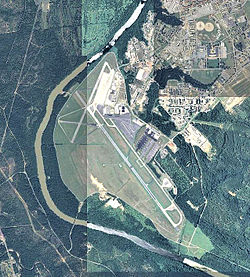Lawson Army Airfield
| Lawson Army Airfield (Fort Benning) | |||||||||||
|---|---|---|---|---|---|---|---|---|---|---|---|

2006 USGS airphoto
|
|||||||||||
| Summary | |||||||||||
| Airport type | Military | ||||||||||
| Owner | United States Army | ||||||||||
| Location |
Fort Benning Columbus, Georgia |
||||||||||
| Elevation AMSL | 232 ft / 71 m | ||||||||||
| Coordinates | 32°20′14″N 084°59′29″W / 32.33722°N 84.99139°W | ||||||||||
| Map | |||||||||||
| Location of Lawson Army Airfield | |||||||||||
| Runways | |||||||||||
|
|||||||||||
|
Source: Federal Aviation Administration
|
|||||||||||
Lawson Army Airfield (IATA: LSF, ICAO: KLSF, FAA LID: LSF) is a military airport located at Fort Benning in Chattahoochee County, Georgia, south of the city of Columbus, Georgia. It is Fort Benning's primary Force Projection Platform.
Lawson Army Airfield has one runway:
In late 1918, the U.S. Army established a new camp for the Infantry School of Arms south of Columbus on the Bussey Plantation. The camp was named in honor of Henry Lewis Benning, a Columbus native who served as a Confederate general during the American Civil War and later as a justice of the Georgia Supreme Court. The Army created a rudimentary landing field at Benning in 1919 with the initial mission of determining if data obtained by balloon observation would benefit the infantry. The airfield consisted of two small hangars that housed the balloon unit.
In 1922, the Army made the facility a permanent Army post renaming the camp Fort Benning. From 1921 to 1931, aircraft from Maxwell Field near Montgomery, Alabama occasionally utilized the airfield for maneuvers and other purposes. In 1928, the balloon unit transferred and the airfield was without any permanent occupation for three years.
In August 1931, the Army named the airfield in honor of Capt. Walter R. Lawson, a Georgia native who had been killed in the crash of a Martin MB-2 at McCook Field, Ohio on 21 April 1923. Lawson served with the 41st French Escadrille during World War I, had one victory, and received the Distinguished Flying Cross for heroism in action. The same year, Flight B of Ft. Riley, Kansas' 16th Observation Squadron, consisting of five officers and 35 enlisted men, moved to Lawson. Flight B operated three Douglas 0-25 aircraft out of a double hangar. Units from Fort Bragg, North Carolina later joined Flight B. The mission of Flight B involved directing artillery fire and spotting enemy positions during maneuvers.
...
Wikipedia

